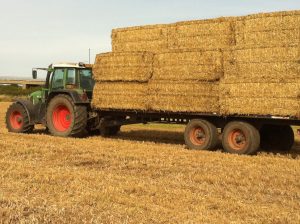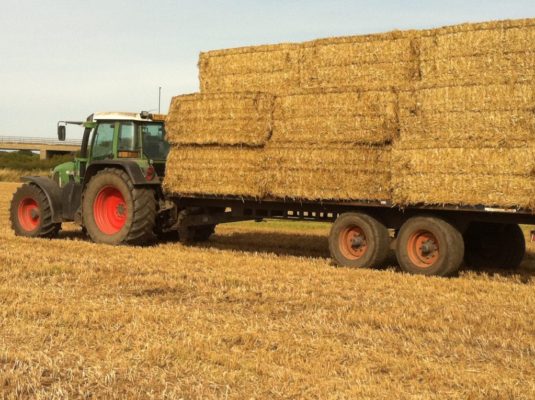Down on the Farm August 2016
The middle of August and the last week of dry weather has seen us flat out on harvesting barley. A patchy growing season has given us slightly smaller grain size and straw yield than we would have liked but it is OK. We use most of the barley ourselves for feeding cattle over the winter so the grain size is not as important as it would be if we were selling to a miller. The barley straw is now all baled and safely inside ready for bedding for the winter. We keep most of the barley straw for the pigs and sheep as it’s softer and more absorbent than the wheat – we use this mainly for cattle bedding.
The oilseed rape is next to be cut – as I write we are getting the combine recalibrated and set up for that. Because the rape seeds are much smaller and lighter than the barley the internal threshing mechanism, sieves and blowers all have to be re-set after the barley so that the combine can do its job efficiently. If we don’t do this too many of the tiny oilseeds will be blown out with the chaff or fall through the sieves. Not only does this reduce the yield but it also means that they will drop to the ground and then germinate amongst next years cereal crop – not ideal. We also add a special vertical side knife to the combine header so that the machine can get through the dense tangle of the rape plants without getting stems wrapped around the rotating reel at the front of the combine.
After the oilseed rape, we will have a few days before we get into the bulk of the wheat crop – always depending on the weather of course. We have actually started sowing next years oilseed rape crop before we have harvested last years. It’s a crop that needs to be planted early to get established – last year we were delayed due to poor autumn weather resulting in poor plant germination and a failed crop in a couple of fields. This is when the pressure really starts to come on when we have to split the team up to cover both harvesting and sowing at the same time. I might even have to work for a living then for a few weeks! Hopefully we will have some decent dry weather over the next month so we can get ahead.
Livestock normally take a bit of a back seat at this time of the year as everything is out at grass and juest needs daily checks etc. there are still the cattle and lambs to be selected for the farm shop though and this gives us an opportunity each week to get up close and check everything is still growing well and putting on condition. We need to be on top of lamb condition all the time now so that we are selecting the better growing ones before they put on too much fat cover. The lambs have done very well over the last few weeks with some sun on their backs and some great fresh regrowth on the silage fields coming through, ideal for younger lambs.
As you know we purchase small weaner pigs and then grow them on at our own farm until they are the right size for the farm shop. Up till now we have sourced these from a farm near Edinburgh but they have decided to now build another finishing building so want to retain all of their production for this. The good news is that we have found a source of very similar weaners much closer to home at Cockle Park near Morpeth. So not only are they reared on our own farm, they have also been born within 10 miles as well. We have taken the opportunity to completely wash and disinfect the whole building where the pigs are reared – the first batch of new pigs is now well settled in and enjoying their new surroundings. Cockle Park Farm is a mixed farm owned by Newcastle University so we might well be doing some work with the students at the farm shop as well, looking at the benefits of the whole “Farm to Fork” process. The university has a very strong agriculture and food science and production department and we have hosted student visits for several years now.


